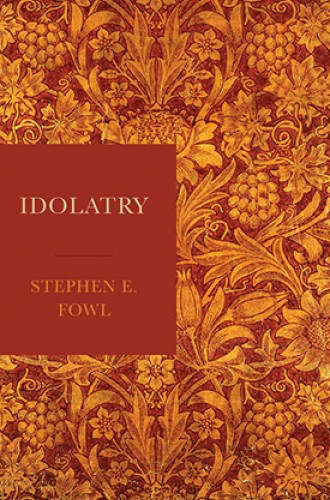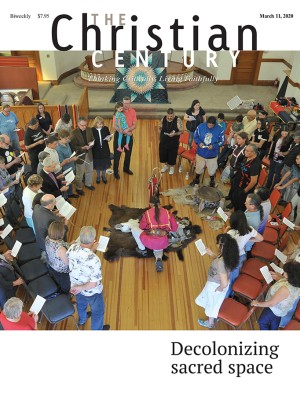It is axiomatic in Jewish and Christian theological traditions that worship is reserved for the one true God alone. To flinch from this obligation in even the smallest way is tantamount to what the Bible calls idolatry. What James 2:10 says of the law—that to keep all of it except in a single point is to transgress against the whole—is true also of worship. The jealousy of Israel’s God is acute when it comes to worship: the Lord will brook no rivals, for in fact there are none.
Scripture affords a plethora of tropes depicting, diagnosing, and indicting idolatry. One trope is the preposterous polytheism of the nations, which manufacture miniature deities out of wood and use the excess material for the fire. Another is the challenge of living as God’s covenant people in alien lands saturated with literal idols and their attendant, abhorrent practices. A third is the fiery judgments of the prophets, who accuse Abraham’s children of forsaking Abraham’s God—of infidelity so great its only comparison is to a married person offering sex for sale to the first bidder.
Read our latest issue or browse back issues.
Amid these well-worn approaches to idolatry, Stephen Fowl takes a different tack. For three decades, Fowl has been the leading voice in theological interpretation of scripture. His 1998 book, Engaging Scripture, was foundational for those who work in the field. Since then he has been steadily producing essays, articles, and books either commenting on theological interpretation or engaging in it (including book-length commentaries on Philippians, Ephesians, and Ruth).
In the introduction to Idolatry, Fowl explains that the book’s aim is “to engage in theology and theological reflection primarily using scriptural texts.” Yet this book differs from his prior work in the sense that it engages the canon as a whole on a single theological theme. It also differs from prior approaches to the subject of idolatry, in at least three ways.
First of all, Fowl is uninterested in the idolatry of nonbelievers. The church consists of those who, by birth or by baptism, already worship the one true God, or at least belong to a community that aims to do so. Gentiles in its midst are defined as those who, in Paul’s words, have “turned to God from idols, to serve a living and true God” (1 Thess. 1:9).
Second, Fowl writes for believers who no longer live in cultures saturated by literal idols, by pagan temples constructed by human hands and dedicated to divinities who receive praise or propitiation through the sacrifice of animals by a caste of priests. To be sure, there are parts of the world that to varying degrees fit this description, but Fowl is not writing with them in mind.
Third, Fowl does not focus his reading on the biblical prophets. This seems odd at first glance. The prophets have much to say about idolatry, not least idolatry within the people of God. Further, their influence in both Jewish and Christian traditions of reflection on idolatry is enormous. But as Fowl puts it, “the prophets do not have a great record of success in turning people away from idolatry.” This is not because they perform their task poorly but because by the time they arrive on the scene, the Lord’s people are very nearly too far gone to turn back. Better by far never to need a prophet in the first place.
Fowl articulates his primary question this way: “Why and how do the people of God become idolaters, and what might be done about this?” No believer, after all, wakes up in the morning and decides to become an idolater. Nor, typically, do believers explicitly forsake worship of the Lord. Rather, believers place the Lord in conjunction with other claimants for attention, so that devotion is shared between them. The problem, in other words, is not “instead” but “also.”
If idolatry is a process, and an unintended one at that, then what Fowl wants is to identify those habits, dispositions, and practices that incrementally turn the church toward idolatry—and, in turn, to identify those habits, dispositions, and practices that might reliably aid the church in maintaining its exclusive worship of the triune God. The goal for believers is disciplined persistence in a singularity of gaze toward Christ, undistracted by the glittering novelties of the world and bound, by sacraments of grace and works of love, to friendship with him alone.
For his diagnoses and prescriptions, Fowl relies on a series of texts from Old and New Testament alike, especially Exodus, Deuteronomy, 1–2 Kings, Isaiah, Luke, Ephesians, Colossians, and 1 John. Fowl’s readings are careful, measured, historically informed, and theologically insightful. They are also quite practical, leavened with anecdotes from his own life as a teacher of undergraduates and a layperson in the Episcopal church. He is alert to the particular context of the audience for which he writes, a context defined by financialized capitalism, gross inequities, political polarization, and racial conflict. He does not shy away from any of these, even as he gives conceptual priority to the biblical texts, following them wherever they may lead, however surprising that may be.
According to Fowl, believers descend into idolatry through habits of forgetfulness, greed, fear, and curiosity. They do not remember the Lord’s goodness and gifts. They desire far more than the bounty of God’s provision. They marinate in anxiety, “seeking security in something other than the Lord,” above all in the realm of politics. They are captivated—ensnared—by the superficially alluring, flashy, and new. The result is that their worship is not exclusive. God, therefore, hands them over to the idols their hearts long for.
Perhaps, Fowl admits, the church in America is already at the point where it is in need of prophets. Perhaps it is already idolatrous. If not, though, there is hope.
Idolatry happens in community, but it is also curbed and rejected in community. Loving the Lord is something we learn to do together, for the Spirit is at work in the body of Christ to enable habits of fidelity in a world angling for “the orchestration of our attention.” Remembering, thanksgiving, neighbor-love, studious and single-minded focus on Jesus—these habits have the power, by God’s grace, to help the church obey the closing injunction of 1 John: “Little children, keep yourselves from idols” (5:21).
Fowl’s wonderful book is a reminder that these words still apply to us.






